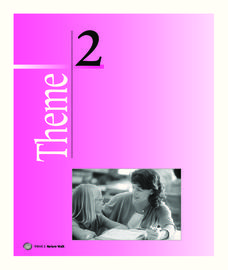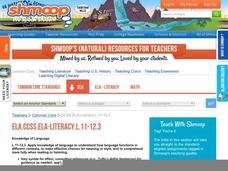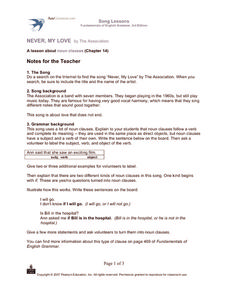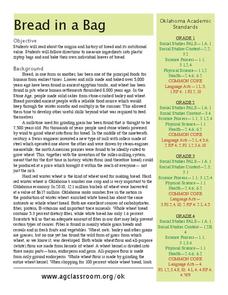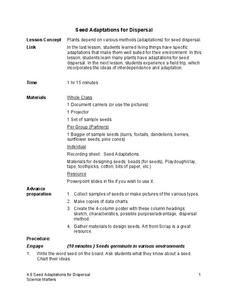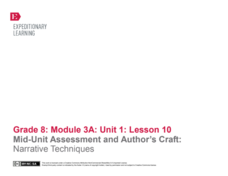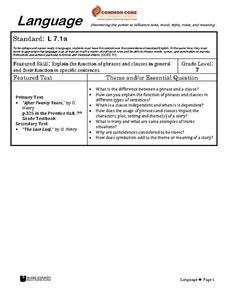Houghton Mifflin Harcourt
Nature Walk: English Language Development Lessons (Theme 2)
Walking in nature is the theme of a unit designed to support English language development lessons. Scholars look, write, speak, and move to explore topics such as camping, woodland animals, instruments,...
Houghton Mifflin Harcourt
Nature Walk: Extra Support Lessons (Theme 2)
Reinforce concepts such as long vowels, spelling patterns, sound clusters, double-final consonants, and syllables with a nature-themed unit. Through a series of extra support lessons, learners compare and contrast using a...
University of Georgia
What's So Special about Bottled Drinking Water?
Is artesian water designed to be better, or is it just from wells similar to those in the city of Artesium? This experiment looks at many different types of bottled waters, including artesian. Using a soap mixture, scholars test to see...
K20 LEARN
Sentence Structure in Siddhartha: Simple, Compound, Complex, and Compound-Complex Sentences
While wisdom may not be communicated, knowledge of sentence structures certainly can. Teach young grammarians the power of syntax with a instructional activity that uses Herman Hesse's Siddhartha as a mentor text. Learners first rewrite...
National Security Agency
Classifying Triangles
Building on young mathematicians' prior knowledge of three-sided shapes, this lesson series explores the defining characteristics of different types of triangles. Starting with a shared reading of the children's book The Greedy...
Core Knowledge Foundation
Weather or Not, Seasons Change
Embark on a year long investigation of the seasons with this 10-lesson earth science unit. After being introduced to different types of weather and the tools used to measure it, young scientists perform fun hands-on activities that...
Shmoop
ELA.CCSS.ELA-Literacy.L.11-12.3
Tired of simple sentences? Bored by brief sentences? Plagued by boring sentences? Enrich your life and the writing of your pupils by modeling how to combine sentences to create more varied syntax. Groups then find a number of ways to...
Curated OER
Identify and Discuss the Author's Purpose
Examine author's purpose in a persuasive text using this scaffolded plan. You essentially have a verbatim script here, but it can definitely be used as an outline instead. Review questions that readers should ask themselves when...
Houghton Mifflin Harcourt
All Together Now: Extra Support Lessons (Theme 1)
All Together Now is the theme of this series of extra support lessons. The collection aids the instruction of blending sounds and reading high-frequency words through writing and reading sentences. Support also engages pupils...
Azar Grammar
Song Lessons: Never, My Love
Here's a clever way to introduce language learners to noun clauses. After a brief exercise that provides examples of different types of noun clauses, class members listen to the Association's "Never, My Love" and identify the clauses in...
Texas State Energy Conservation Office
Investigation: Concept Mapping Fuels
After reading an article, "Fuels for Everything," collaborative groups create a concept map poster of the transportation and non-transportation fuels. This makes a strong introduction to the different types of fuels used for transportion...
Curated OER
Bread in a Bag
Could the history of bread really be interesting? Yes, it could! An informational text gives scholars wheat production background from 8,000 years ago, discussing different types of bread and the current industry in Oklahoma. Learners...
Curated OER
The Swiss Family Robinson Teacher's Notes
Guide young readers through the classic novel The Swiss Family Robinson with this collection of activities and worksheets. From basic spelling and grammar practice, to reading comprehension skills, this resource will enhance...
Federal Reserve Bank
Invest in Yourself
What are the different ways that people can invest in their human capital for a better future? Pupils participate in an engaging hands-on activity and analyze data regarding unemployment, the ability to obtain an education, and median...
Science Matters
Seed Adaptations for Dispersal
After a grand conversation about seeds, adaptation, and dispersal, scholars work collaboratively to examine seeds and record their findings on a four-column chart. Small groups share their observations and further discuss seed...
Reed Novel Studies
The Westing Game: Novel Study
A legacy lives on. Even though Samuel Will Westing, a character in the The Westing Game, has passed away, his love for games lives on through the unusual selection in his will. Scholars read of the mystery, learn 10 new vocabulary words,...
Council for the Curriculum, Examinations and Assessment
Feelings and Emotions
The focus of the second in a 10-session course on Social, Physical, Emotional, Cognitive and Spiritual (SPECS) health is on learning to express and manage feelings appropriately. Class members learn different ways of...
EngageNY
Mid-Unit Assessment and Author’s Craft: Narrative Techniques
Scholars work together to compile a list of things good writers do to perfect their craft and write the ideas on a whiteboard. They then discuss the differences between passive and active sentences and use their knowledge to identify...
Curated OER
Using Context Clues
Middle schoolers receive a handout that lists the five types of context clues. The class divides up into groups of three or four, and each group chooses five unfamiliar words. They write a multiple-choice question for each of their five...
Wake County Public Schools
Language
Have your class doing everything from reading literature, analyzing literary devices, identifying independent and dependent clauses, discussing, and writing creatively with the rich resource found here. After a mini lesson on independent...
Film English
365 Grateful
Encourage gratitude with a short film. Pupils first explore what grateful means and come up with five things they are grateful for. After a discussion, they watch the short film twice and discuss the content after each viewing,...
Curated OER
Animals Galore
A well-designed lesson which covers the characteristics of the animals found in the six animal groups is here for your young biologists. In it, learners divide up into six groups; the amphibians, reptiles, mammals, birds, fish, and...
Curated OER
Express Yourself
Reading with expression excites listeners of any age. They will discuss different ways to change their reading expression as they listen to the teacher read Froggy Goes to the Doctor. Then in small groups, they'll practice reading...
Center for Learning in Action
Challenge with Solids, Liquids, and Gases
There's a container for every matter—liquid, solid, and gas. Pupils design three different containers, each with the capability to hold one of the states of matter, and share their design with the class.

